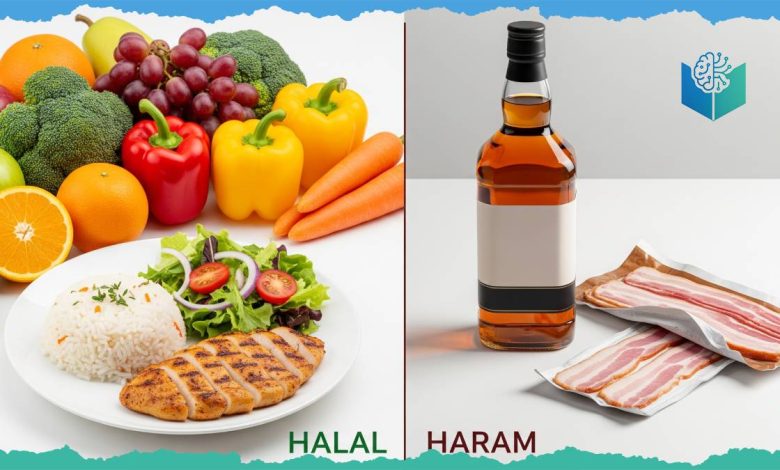Halal and Haram in Islam

For anyone exploring about Islam, one of the first concepts they encounter is Halal and Haram. These two words shape much of a Muslim’s lifestyle—from the food they eat, to their daily habits, and even how they conduct themselves in society. Far from being complicated, they provide clear guidance on how to live in harmony with faith.
This article is designed as a beginner’s guide to Halal and Haram, rooted directly in the Quran. By the end, you will understand the basics of Islamic dietary laws, the ethics behind them, and why they matter for a lifestyle muslim who seeks balance and purpose.
Halal and Haram in Islam: A Complete Guide
What Do Halal and Haram Mean?
The word Halal means “permissible” or “lawful,” while Haram means “forbidden” or “prohibited.” In Islamic etiquette, everything in life falls into one of these categories.
The Quran makes this clear:
“O mankind, eat from whatever is on earth [that is] lawful and good, and do not follow the footsteps of Satan. Indeed, he is to you a clear enemy.” (Quran 2:168)
This verse shows that Halal is not just about permission but also about what is wholesome and beneficial. In contrast, Haram refers to what causes harm, injustice, or spiritual corruption.
Halal Food Rules: The Basics
Food is often the first area people associate with Halal and Haram. Islam provides specific guidance, making it easy for a beginner’s guide to Halal to start here.
“Prohibited to you are dead animals, blood, the flesh of swine, and that which has been dedicated to other than Allah…” (Quran 5:3)
From this verse, we learn the foundations of Halal food rules:
- Halal animals must be slaughtered in Allah’s name.
- Blood and carrion (already dead animals) are Haram.
- Pork is always Haram.
- Food sacrificed to idols or other than Allah is Haram.
These rules form the core of Islamic dietary laws, ensuring that food is not only physically clean but spiritually pure.
What Is Haram in Islam Beyond Food?
While many people think of pork or alcohol when they hear Haram, the Quran extends this concept far beyond diet. Haram includes:
- Dishonesty and injustice in dealings.
- Usury (riba), which exploits the poor.
- Immorality and indecency.
- Consuming intoxicants.
The Quran warns:
“Indeed, intoxicants, gambling, [sacrificing on] stone alters [to other than Allah], and divining arrows are but defilement from the work of Satan, so avoid it that you may be successful.” (Quran 5:90)
This shows how Haram covers anything that harms individuals or society. For a lifestyle muslim, avoiding Haram is not about restriction but about living free from harm and corruption.

The Wisdom Behind Halal and Haram
Many new learners about Islam wonder why Islam has rules about food and actions. The Quran emphasizes that these are not arbitrary restrictions but divine wisdom meant to protect us.
“They ask you what has been made lawful for them. Say, ‘Lawful for you are [all] good foods…’” (Quran 5:4)
This means Halal encourages health, fairness, and spiritual purity. By avoiding Haram, Muslims guard their hearts, bodies, and communities from harm.
Halal and Haram in Everyday Life
To understand Halal and Haram, one must see them as part of daily living. It’s not just about what goes on the plate but also how one earns money, behaves, and interacts.
For example:
- Work: Earnings must come from honest sources, not cheating or exploitation.
- Speech: Backbiting and lying are Haram.
- Relationships: Respect, kindness, and modesty are Halal; abuse and injustice are Haram.
This wider understanding shows how Halal and Haram form the backbone of Islamic etiquette and good character.
Islamic Dietary Laws Explained Simply
Islamic dietary laws are practical and straightforward for beginners. They focus on:
- Permissibility – Everything is Halal unless clearly forbidden.
- Purity – Food and drink must be clean.
- Avoiding Harm – Anything proven to damage the body or soul is Haram.
For a beginner’s guide to Halal, it’s important to see that these laws promote health, fairness, and gratitude to Allah.

The Role of Intention in Halal and Haram
Islam teaches that intention matters. Even if something is technically Halal, using it with the wrong purpose can make it Haram.
The Quran reminds us:
“They were not commanded except to worship Allah, [being] sincere to Him in religion…” (Quran 98:5)
So a lifestyle muslim doesn’t just avoid Haram but seeks Halal with sincerity, using it as a way to grow closer to Allah.
Halal Food Rules for Beginners
If you’re new to Islamic teachings, here’s a simple checklist:
- Check if meat is Halal-certified or slaughtered properly.
- Avoid alcohol in any form.
- Be cautious with processed foods that may contain animal by-products.
- Prefer wholesome, natural, and clean food.
This is the easiest way to start living by Halal food rules as a beginner.
Halal and Haram in Finance
Islamic dietary laws are well-known, but finance is another area where Halal and Haram apply strongly. The Quran prohibits unjust profit systems like usury (riba).
“…Allah has permitted trade and has forbidden interest.” (Quran 2:275)
This rule protects society from exploitation, showing that Halal extends to fairness in wealth and transactions.

The Balance Between Halal and Haram
One of the most beautiful aspects of Islam is balance. Allah does not forbid what is good for people; rather, He forbids what harms them.
“Allah intends for you ease and does not intend for you hardship.” (Quran 2:185)
This verse assures us that Halal and Haram are not meant to burden but to guide towards a healthy, balanced life.
Living as a Lifestyle Muslim
For a lifestyle muslim, practicing Halal and avoiding Haram is not just ritual—it becomes identity. It shapes eating habits, work choices, friendships, and even how one spends free time.
By following Islamic dietary laws and ethical principles, a Muslim transforms everyday actions into worship. This creates peace within the self and harmony with society.
Why Halal and Haram Matter for Beginners
For someone exploring about Islam for the first time, Halal and Haram may feel overwhelming. But the Quran teaches that Allah has made the path easy. Start small—focus on food, honesty, and avoiding obvious wrongs. Over time, it becomes a natural way of life.
Conclusion
Understanding Halal and Haram is essential for living with faith, dignity, and balance. Whether it’s through Islamic dietary laws, fair business practices, or daily manners, Halal brings purity and blessing while Haram is avoided to protect from harm.
For a beginner’s guide to Halal, it’s not about restriction but about building a wholesome, God-centered life. By following the Quran, Muslims turn even ordinary acts like eating or speaking into worship.
To dive deeper into the wisdom of the Quran and explore practical guides for a lifestyle muslim, visit ayaat.ai—a resource dedicated to understanding divine guidance directly.
Q&A
What is halal and haram?
Halal means what is lawful and permissible in Islam, while Haram refers to what is forbidden. The Quran guides Muslims in distinguishing between the two to build a pure and balanced life.
What does haram mean in Islam?
In Islam, Haram means anything that Allah has forbidden, whether in food, actions, or behavior. The Quran defines Haram as what harms faith, body, or society, urging believers to avoid it.
What are the rules of halal?
The rules of Halal require food and actions to be pure, clean, and lawful according to the Quran. This includes permissible meat slaughtered in Allah’s name, avoiding alcohol, and staying away from anything harmful.





